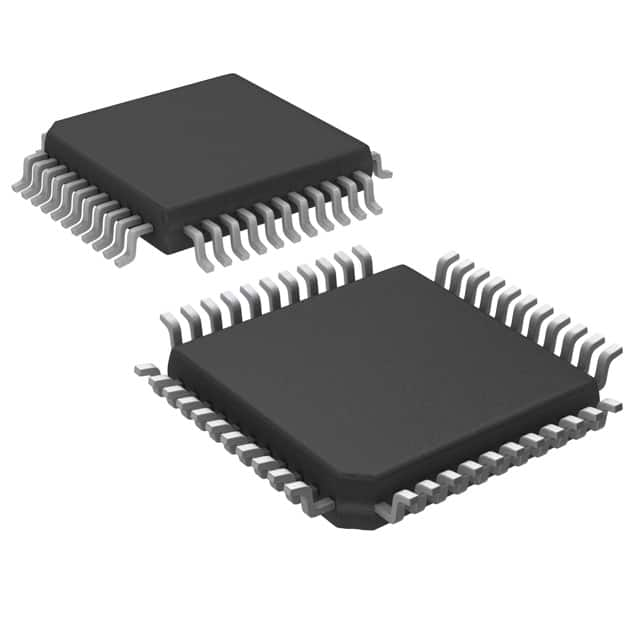PIC17C44-16E/PQ
Product Overview
Category
The PIC17C44-16E/PQ belongs to the category of microcontrollers.
Use
This microcontroller is commonly used in various electronic devices and embedded systems for controlling and processing data.
Characteristics
- High-performance 8-bit microcontroller
- Low power consumption
- Enhanced features for efficient data handling
- Wide operating voltage range
- Robust and reliable design
Package
The PIC17C44-16E/PQ comes in a PQFP (Plastic Quad Flat Pack) package, which provides ease of installation and compactness.
Essence
The essence of the PIC17C44-16E/PQ lies in its ability to provide advanced control and processing capabilities in a small form factor.
Packaging/Quantity
This microcontroller is typically packaged in reels or tubes, with each containing a specific quantity of units. The exact packaging and quantity may vary depending on the manufacturer and supplier.
Specifications
- Architecture: 8-bit
- CPU Speed: 16 MHz
- Program Memory Size: 8 KB
- RAM Size: 368 bytes
- Number of I/O Pins: 33
- Operating Voltage Range: 2.5V - 5.5V
- Data Bus Width: 8-bit
- ADC Channels: 8
- Timers: 3
- Communication Interfaces: UART, SPI, I2C
Detailed Pin Configuration
The PIC17C44-16E/PQ has a total of 44 pins, each serving a specific purpose. Here is a detailed pin configuration:
- VDD - Power supply voltage
- RA0 - General-purpose I/O pin
- RA1 - General-purpose I/O pin
- RA2 - General-purpose I/O pin
- RA3 - General-purpose I/O pin
- RA4 - General-purpose I/O pin
- RA5 - General-purpose I/O pin
- MCLR - Master Clear input
- VSS - Ground
- RB0 - General-purpose I/O pin
- RB1 - General-purpose I/O pin
- RB2 - General-purpose I/O pin
- RB3 - General-purpose I/O pin
- RB4 - General-purpose I/O pin
- RB5 - General-purpose I/O pin
- RB6 - General-purpose I/O pin
- RB7 - General-purpose I/O pin
- RC0 - General-purpose I/O pin
- RC1 - General-purpose I/O pin
- RC2 - General-purpose I/O pin
- RC3 - General-purpose I/O pin
- RC4 - General-purpose I/O pin
- RC5 - General-purpose I/O pin
- RC6 - General-purpose I/O pin
- RC7 - General-purpose I/O pin
- OSC1 - Oscillator input
- OSC2 - Oscillator output
- VCAP - Capacitor connection for oscillator stability
- RD0 - General-purpose I/O pin
- RD1 - General-purpose I/O pin
- RD2 - General-purpose I/O pin
- RD3 - General-purpose I/O pin
- RD4 - General-purpose I/O pin
- RD5 - General-purpose I/O pin
- RD6 - General-purpose I/O pin
- RD7 - General-purpose I/O pin
- RE0 - General-purpose I/O pin
- RE1 - General-purpose I/O pin
- RE2 - General-purpose I/O pin
- VSS - Ground
- VDD - Power supply voltage
- VSS - Ground
- VDD - Power supply voltage
- VSS - Ground
Functional Features
The PIC17C44-16E/PQ offers several functional features that enhance its performance and usability:
- High-speed processing capabilities for efficient data handling.
- Built-in peripherals such as UART, SPI, and I2C for seamless communication with other devices.
- On-chip memory for storing program code and data.
- Analog-to-Digital Converter (ADC) channels for precise analog signal measurements.
- Timers for accurate timing and event management.
- Low power consumption for energy-efficient operation.
- Robust design to withstand harsh environmental conditions.
Advantages and Disadvantages
Advantages
- High-performance microcontroller suitable for a wide range of applications.
- Compact form factor allows for integration into space-constrained designs.
- Wide operating voltage range enables compatibility with various power sources.
- Enhanced features provide efficient data handling and control capabilities.
- Robust design ensures reliability in demanding environments.
Disadvantages
- Limited program memory size may restrict the complexity of
Lista 10 Vanliga frågor och svar relaterade till tillämpningen av PIC17C44-16E/PQ i tekniska lösningar
What is the operating voltage range of PIC17C44-16E/PQ?
- The operating voltage range of PIC17C44-16E/PQ is 4.5V to 5.5V.What are the key features of PIC17C44-16E/PQ?
- Some key features of PIC17C44-16E/PQ include 8-bit microcontroller, 16 MHz operation, and 4K x 14 words of EEPROM data memory.Can PIC17C44-16E/PQ be used in automotive applications?
- Yes, PIC17C44-16E/PQ is suitable for automotive applications due to its robust design and wide operating voltage range.What programming language can be used to program PIC17C44-16E/PQ?
- PIC17C44-16E/PQ can be programmed using assembly language or high-level languages such as C.Is PIC17C44-16E/PQ suitable for battery-powered devices?
- Yes, PIC17C44-16E/PQ's low power consumption makes it suitable for battery-powered devices.What communication interfaces does PIC17C44-16E/PQ support?
- PIC17C44-16E/PQ supports serial communication interfaces such as UART, SPI, and I2C.Can PIC17C44-16E/PQ be used in industrial control systems?
- Yes, PIC17C44-16E/PQ is well-suited for industrial control systems due to its reliability and robustness.What development tools are available for PIC17C44-16E/PQ?
- Development tools such as MPLAB X IDE and PICkit programmers are available for programming and debugging PIC17C44-16E/PQ.Does PIC17C44-16E/PQ have built-in analog-to-digital converters (ADC)?
- Yes, PIC17C44-16E/PQ has built-in ADC modules for analog signal processing.Can PIC17C44-16E/PQ be used in temperature-sensitive applications?
- Yes, PIC17C44-16E/PQ's operating temperature range of -40°C to 125°C makes it suitable for temperature-sensitive applications.


